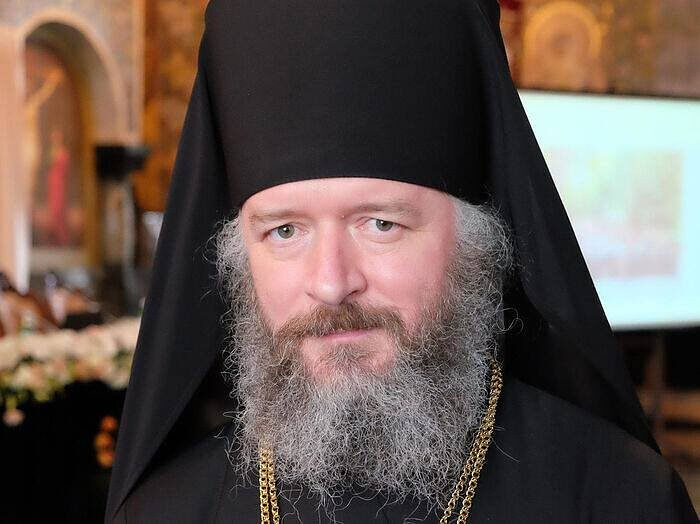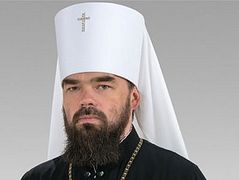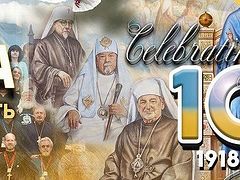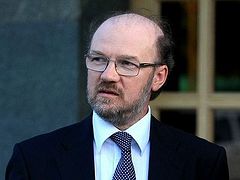—Father Markell, the streets of Kiev are teeming with billboards showing a smiling (sorry but I think it is a spiteful grin) “metropolitan” Epiphany Dumenko, the head of the OCU schismatic group, and one of his quotes. His statement about the recent anniversary celebration of the Baptism of Rus’ reads as follows: “The 28th of July is the 1033rd anniversary of the establishment of Ukrainian statehood.”[1] How could you comment on this political statement? In your opinion, what is the goal of pseudo-metropolitan with followers?
—Currently, their major goal is self-validation. To achieve this, for one, they use state political leverage in an attempt to gain, in league with Patriarch Bartholomew, recognition of their leadership by all Autocephalous Orthodox Churches, even sacrificing Philaret, who conceived them, on their way. On the other hand, they initiated a massive rewriting of history. Their goal is to underscore that not all Rus’, but Ukraine alone, is the rightful heir of St. Vladimir’s Baptism—thus setting Ukraine against Russia and justifying their existence and schism. The Uniate Greek Catholics have been applying the same tactics of self-validation ever since they fell away from the Orthodox Church in 1596.
Self-validation is the chief character trait for those who fall away from God, even if they still confess Him with their mouths. However, not self-validation, but a voluntary self-humiliation or, in the terminology of hesychast tradition, humility, is the cornerstone of true Christianity. For God resists the proud, but gives grace to the humble (1 Peter 5:5).
—Does this special “rendering” of history have anything to do with the arrival of Patriarch Bartholomew eagerly awaited by the schismatics?
—The arrival of Patriarch Bartholomew is another opportunity to establish their schismatic identity. That’s exactly what every civil news outlet emphasized as they commented on the arrival of the Patriarch. At the same time, through this kind of propaganda, it is important for them to justify his arrival to the general public. They made an attempt to underscore that it isn’t just a church hierarch attending to the interests of politicians who comes, but a spiritual leader; and through him, as they insist, the state is retrieving the “church independence it lost some time ago due to Moscow’s machinations.”
We can see here that the schismatics do not understand what the Church is all about. For them, the Church isn’t a Theanthropic Body, who like a mother patiently brings together her children scattered by sin all over the world. For them, she is merely a political institution that helps to resolve their short-term state policies.
I should point out that a similar perception of the Church has occurred in history before. The Great Schism of 1054 happened under similar circumstances, when the Roman Catholics fell away from Orthodoxy. In the eighteenth century, Peter I and Empress Catherine the Great of Russia, who pursued a policy of secularization, built up the relationship between the Church and the state in a like manner. As a result, it led the upper class and the intellectuals away from the Church, and this later culminated in the bloody events of the early twentieth century, when the godless Bolsheviks rose to power armed with a political goal to annihilate the Christian faith.
—The fact that President Zelensky invited the Patriarch from Istanbul is every indication that the state is continuing its policy of interference in the life of the Church—a policy initiated by his predecessor Poroshenko in violation of the Ukrainian Constitution. Even the invitation for the Pope of Rome to visit our country issued by Leonid Kuchma, Ukraine’s former president, was more justified since the Pope arrived as the head of the state of the Vatican. Doesn’t Bartholomew understand he is being dragged into the political games of the world’s power players? Or, is it simply profitable for him to play out a new schism on the territory of the canonical Ukrainian Orthodox Church?
—Every man is driven by the desire to leave a certain legacy behind. The higher a politician’s or church hierarch’s level, the stronger the temptation. Some will do it quietly, in humility, doing good deeds and leading the life of an ascetic, like the Serbian Patriarch Pavle (†2009)—who, for example, was celebrated for his meekness, great love of Christ, and unwillingness to attract the attention of the world. Others get involved in dubious political projects thinking that by doing this they serve Christ and the people, yet this kind of activity usually ends up with deplorable results. How many tears of ordinary faithful Ukrainians were shed following the takeovers of the Orthodox churches by the schismatics, but how many more will be shed since the visit by Patriarch Bartholomew to Ukraine will nonetheless take place!
The visit of the Pope of Rome during Kuchma’s presidency didn’t bring any positive results for our country either. It merely split the country by pitting the Orthodox of the east against the Uniates of the west, and in the end it led to the first and second Maidan and the violence in Donbass, further exacerbating Russophobia in society.
—During the recent service in the OCU, Dumenko commemorated the Orthodox Patriarchs, including His Holiness Patriarch Kirill, but he called him not the Patriarch of the Russian Church, as is his official title, but “Russia-based”…
—True. He always commemorates Patriarch Kirill of Moscow during his services but not because of love or reverence, as should be the case for all Christians according to the Gospel, but again, with the idea of self-validation and under the guise of compliance with the canonical law requiring such a remembrance of Patriarch of Moscow. But it’s pure hypocrisy! Everyone knows that he considers Patriarch Kirill, taunted by the nationalists with his message about the Russian world and vocal support of President Putin, an enemy of Ukraine. At the same time, our Orthodox priests who commemorate His Holiness Patriarch Kirill during liturgy are vilified by the nationalist-leaning people in every possible way and even get expelled from their churches, whereas Epiphany, as you see, can do so freely… It is the schismatics’ trademark behavioral style—replete with lies, malice, and deceit.
—Speaking of language. “OCU” pretends to operate across all of Ukraine, since Dumenko is called “His Beatitude of all Ukraine,” but why are their sermons and the services conducted exclusively in Ukrainian? What does the Russian-speaking population of the eastern and southern parts of Ukraine have to do, since there are registered “OCU” parishes even there?
—For our Ukrainian Orthodox Church, the Church Slavonic language of the church service is not only the most convenient way to address God as it helps to quickly lay aside all worldly cares during prayer. It is also an instrument used to achieve the spiritual union of Slavic nations—Russians, Ukrainians, Serbs, Bulgarians, Orthodox Poles, Czechs, and Slovaks. The OCU, with its forceful promotion of the Ukrainian language for use at a church service—not solely in western but also eastern Ukraine—sets itself against a part of the population that views Russian as its native language, for they learned it at mother’s knees. It once again attests to the fact that their religious organization has nothing to do with the otherworldly supernatural essence but is a purely political artifice. Their main goal is to drive the wedge of division between the Russians and the Ukrainians even further and to “prove” that they aren’t two brotherly nations with common history but two completely alien political entities.
—In connection with the topic of our conversation, please tell us a few words about the significance of the recent Great Procession of the cross held on July 27.
—Above all else,despite the fierce attempts by opportunistic politicians, with their flattering speeches about peace and unity in Ukraine, to bully and divide everyone, the procession of the cross bore testimony to the spiritual unity of people from west to east and from south to north. But 350,000 pilgrims walking in the procession from the St. Vladimir’s Hill to the Lavra is both a great number and not enough if we remember that not ninety percent but at the most five to ten percent of all Ukrainian citizens are church-going members of our Church. We still have got a lot of work left lying ahead. The harvest truly is great, but the laborers are few (Luke 5:2). These words by the Savior retain relevance at all times.
The Great Procession of the cross in Kiev on July 27 of this year dedicated to the memory of the Holy Equal-to-the-Apostles Prince Vladimir and the 1033rd anniversary of the Baptism of Rus
We must increase our preaching a hundredfold. When we are silent, the media landscape is filled with those for whom, according to the words by Apostle Paul, their god is their belly, and glory is in their name—who set their mind on earthly things (Philippians 3:19). Besides, when we are silent, doesn’t it mean we see no significant difference between the lives of believers and non-believers?
We must increase our preaching a hundredfold
Nowadays, it is imperative that we teach people to discern between truth and a lie, and what’s more important, to lead them not to the bright earthly paradise like godless communists once promised, in league with today’s nationalists, but to the Kingdom of Heaven. This Kingdom inside every man isn’t built upon rage and pride, bribery and fraud but on humility and complete forgiveness, love and truth of God.
—Father, what do you think—don’t the schismatics in the person of such figures as former UOC metropolitans Alexander Drabinko and Simeon Shostatsky, archpriest Georgiy Kovalenko, Pyotr Zuyev with others who held senior positions in our Church and stood against the schism, condemning it, understand that they have bowed themselves to a policy of opportunism in the creation of the “OCU”? Even that same Drabinko defended his thesis on the topic of schism, while Georgiy Kovalenko was a UOC spokesman and denounced schism in mass media in every way possible, while Pyotr Zuyev, who broke away from Philaret in due time, used to write massive articles in “SOS” newspaper under the headline, “Moscow is the third Rome, and their shall not be a fourth!”
—When they were still members of our Church, many of them, despite their missionary and educational activity, harbored cold-hearted opportunism. Most likely it was because they carried out their service not out of love but in order to please their vanity and ambitions, win fame, and, once again, to gain self-validation. I speak of this with confidence, as I know many of them too well and still pray for them in hopes that they will repent and return into the fold of the canonical Church where they were baptized and took their oath during consecration; the Church that entrusted them with her flock and elevated them to hierarchical positions. Alas, the interests of ordinary believers have always been and still remain their lowest priority.
Every Christian is in a constant struggle of evil thoughts of self-indulgence over the good wishes of selfless service to God and the people. Not everyone is always successful at their resolve to oppose evil and establish themselves to do good. All of us can sometimes fall into various temptations. But as long as we retain the spirit of repentance, all is not lost. Step by step, we are winning small victories over ourselves and the evil one. The worst of all is when, instead of condemning himself for his weaknesses and repenting, one begins to condemn others. That’s how people end up in schism and religious sects. Constant condemnation and indignation against other people promoted by media outlets greatly please a wicked man who doesn’t participate in authentic church life. That’s how treason and all other adversities emerge.
—In your opinion, how should the faithful of the canonical Church think about all that’s happening? Are there many people among the faithful who are inclined to view it as the approaching time of persecution?
—The Lord Himself warned about the coming persecution of the faithful: If they persecuted Me, they will also persecute you (john 15:20). The sin, compared to darkness by the holy fathers, avoids light. We should rather worry about how we don’t become the reason for the persecutions because of our own careless lives. The Lord speaks about it as well: Woe to the world because of offenses! For offenses must come, but woe to that man by whom the offense comes! (Matthew 18:7). There is one positive and educational factor in persecutions. As St. John Chrysostom writes, when everything is going well for us as Christians, we are prone to become slack. But a time of persecution helps us to be vigilant. So, we must thank the Lord for everything, equally for life’s pleasures and its afflictions. If we keep feeling this way, who shall separate us from the love of Christ? Shall tribulation, or distress, or persecution, or famine, or nakedness, or peril, or sword? (Romans 8:35).
—And the last thing: The seventh anniversary of the enthronement of His Beatitude Onufry at the Metropolitan See of Kiev is approaching fast. What is your assessment of such a challenging time in the life of the Church headed by Her Primate, the Metropolitan of Kiev and All Ukraine?
—Typically, people inexperienced in spiritual life look at the church hierarchs and their service with envy or even anger, seeing only the obvious, glitzy front of their activities. But as a matter of fact, the higher the Church hierarch‘s rank, the more temptations of various forms he has to endure, both from their flock and from those outside the Church. Sometimes the blows received from friends are far more painful than from our foes. Thanks to his unceasing ascetic deeds of prayer and repentance, our Blessed Metropolitan Onufry manages not only to preserve his balance in life, never breaking down or faltering, but also to remain a steadfast supporter of millions of people. He prays fervently for all of us while we pray for him, and that’s how we find salvation amidst these temptations and troubles.





